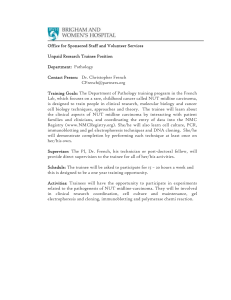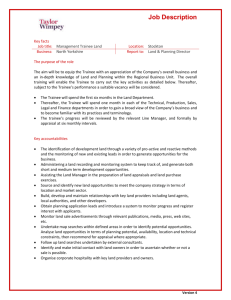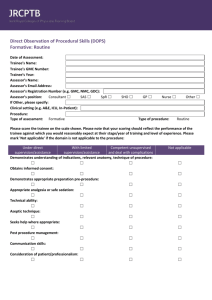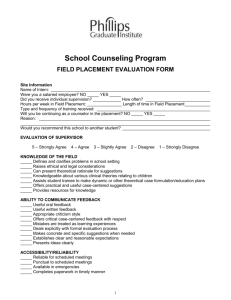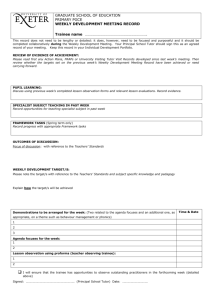special interest training post in interventional radiology
advertisement
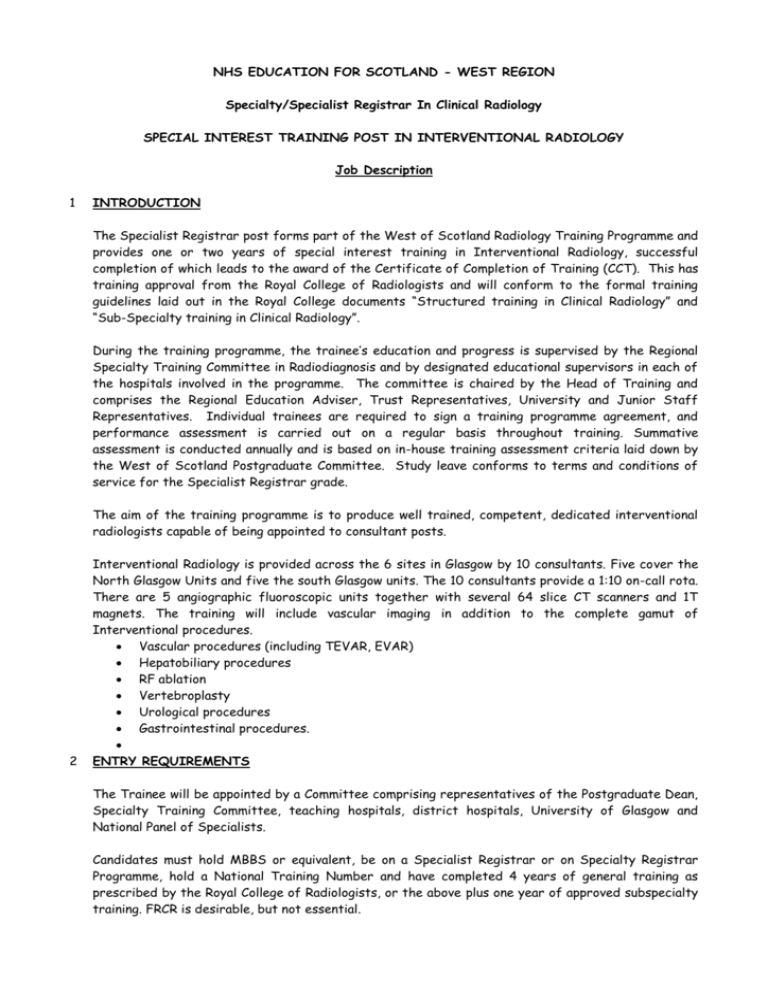
NHS EDUCATION FOR SCOTLAND - WEST REGION Specialty/Specialist Registrar In Clinical Radiology SPECIAL INTEREST TRAINING POST IN INTERVENTIONAL RADIOLOGY Job Description 1 INTRODUCTION The Specialist Registrar post forms part of the West of Scotland Radiology Training Programme and provides one or two years of special interest training in Interventional Radiology, successful completion of which leads to the award of the Certificate of Completion of Training (CCT). This has training approval from the Royal College of Radiologists and will conform to the formal training guidelines laid out in the Royal College documents “Structured training in Clinical Radiology” and “Sub-Specialty training in Clinical Radiology”. During the training programme, the trainee’s education and progress is supervised by the Regional Specialty Training Committee in Radiodiagnosis and by designated educational supervisors in each of the hospitals involved in the programme. The committee is chaired by the Head of Training and comprises the Regional Education Adviser, Trust Representatives, University and Junior Staff Representatives. Individual trainees are required to sign a training programme agreement, and performance assessment is carried out on a regular basis throughout training. Summative assessment is conducted annually and is based on in-house training assessment criteria laid down by the West of Scotland Postgraduate Committee. Study leave conforms to terms and conditions of service for the Specialist Registrar grade. The aim of the training programme is to produce well trained, competent, dedicated interventional radiologists capable of being appointed to consultant posts. 2 Interventional Radiology is provided across the 6 sites in Glasgow by 10 consultants. Five cover the North Glasgow Units and five the south Glasgow units. The 10 consultants provide a 1:10 on-call rota. There are 5 angiographic fluoroscopic units together with several 64 slice CT scanners and 1T magnets. The training will include vascular imaging in addition to the complete gamut of Interventional procedures. Vascular procedures (including TEVAR, EVAR) Hepatobiliary procedures RF ablation Vertebroplasty Urological procedures Gastrointestinal procedures. ENTRY REQUIREMENTS The Trainee will be appointed by a Committee comprising representatives of the Postgraduate Dean, Specialty Training Committee, teaching hospitals, district hospitals, University of Glasgow and National Panel of Specialists. Candidates must hold MBBS or equivalent, be on a Specialist Registrar or on Specialty Registrar Programme, hold a National Training Number and have completed 4 years of general training as prescribed by the Royal College of Radiologists, or the above plus one year of approved subspecialty training. FRCR is desirable, but not essential. 3 AWARD OF CCT On appointment the Trainee will retain their current National Training Number and will be given a provisional date for the award of CCT, which may be extended up to a maximum of a year in order to allow completion of the sub –specialty training. This date will be subject to confirmation by the Royal College of Radiologists. Award of CCT will be dependent upon dependent upon successful completion of the training. 4 LOCATION OF DUTIES The hospitals involved in the sub-specialty training programme are as follows: Glasgow Royal Infirmary Western Infirmary/Gartnavel General Hospital Southern General Hospital Victoria Infirmary Typically, a trainee appointed for two years would spend their initial six months at the Victoria Infirmary and Southern General Hospital, learning basic techniques and management principles, then move to the North Glasgow Hospitals for the second six months. The second year of training would be arranged to suit the further needs and interests of the trainee. A trainee appointed for a sixth year only would have a rotation arranged to suit individual training requirements. Please note that Vascular services at Glasgow & Clyde are being reorganised and will be centred at Western Infirmary. 5 DUTIES OF THE POST Clinical The Trainee must make full use of the training opportunities provided in each placement. The Trainee will be expected to participate fully in the clinical work of the department. Taking into account the level of training and experience, this will include: the radiological investigation and care of patients referred to the department. the formal reporting of radiological investigations the supervision of radiographic procedures advice and guidance to clinical colleagues as to the most appropriate radiological investigations. Supervision by consultant staff will always be available. Administration And Management The Trainee will be expected, when appropriate, to participate in the day to day running of the department in administrative activities such as organisation of on-call rotas, organisation of undergraduate training, patient reports and letters. The Trainee will have the opportunity to develop management skills as required by the College. 2 6 EDUCATION (i) Continuing Education The Trainee will be expected to participate in educational activities on a local and national basis. All hospitals enjoy well stocked departmental libraries and in addition comprehensive education facilities. Management development is encouraged and the Trainee will be expected to attend appropriate courses. (ii) Teaching The Trainee will be expected to undertake teaching at postgraduate and, if necessary, undergraduate levels. 7 RESEARCH AND AUDIT (i) Research There is a strong tradition of research in Interventional radiology in Glasgow. Facilities and support for research activities are available through University links and within hospital departments. There is one WTE research coordinator and shortly a second will be in post. The trainee will be encouraged to participate in clinical research and time will be allocated consistent with current Terms & Conditions. Participation at both national and international meeting will be strongly encouraged. (ii) Audit Audit is encouraged throughout the training period and is also a requirement of the College. It is expected the trainees will participate in the BSIR national registries. 8 ASSESSMENT i) The Trainee will be continuously assessed by the trainers in their place of work with formal interviews every 3 months and annual review by the Sub-Committee in Radiodiagnosis of the West of Scotland Deanery. (ii) If, in the opinion of the Training and Assessment Committee, the Trainee fails to show adequate commitment or progress, career guidance will be arranged, and exceptionally, in the absence of satisfactory progress, the committee may recommend that the contract be terminated. Trainees are required to keep a logbook following the requirements laid down by the Royal College of Radiologists. 3 9 GENERAL INFORMATION (i) Hours and Salary Your hours of duty will be the standard working week of 40 hours for which you will receive a standard salary (as detailed in paragraph 8b, Appendix 1 of the Terms and Conditions of Service, appended under general information). The supplementary payment for out of hours duty is banded according to the intensity of the work at each hospital and a supplement will be paid, as locally agreed. This will be stated in the contract of employment. (ii) Exposure Prone Invasive Procedures The holder of this post will be required to undertake on a regular or occasional basis Exposure Prone Invasive Procedures (EPIS). As this could potentially place patients at risk, candidates must show evidence of immune status to Hepatitis B or agree to undergo the necessary procedures. 10 FURTHER INFORMATION For further Information please contact Dr G Urquhart, Consultant Radiologist, Southern General Hospital, Glasgow. Tel: 0141 201 1540 Or Dr A Downie, Consultant Radiologist, Victoria Infirmary, Glasgow G42 9TY Telephone 0141 201 5551. Or Professor J Moss, Consultant Radiologist, Gartnavel General Hospital, 1055 Gt Western Rd, Glasgow G12 0YN Telephone 0141 211 3113. 4




